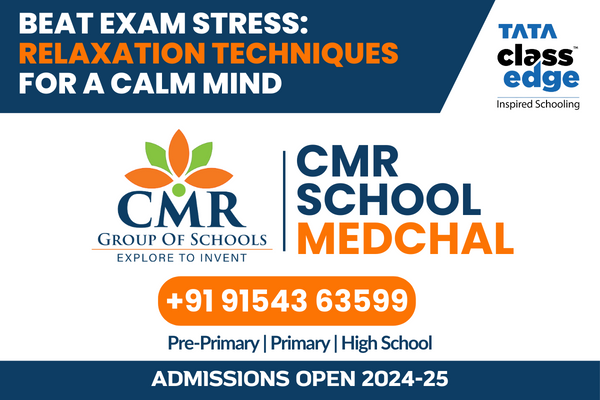Exams can often bring about feelings of stress and anxiety in students. At CMR School Medchal, we understand the importance of supporting students’ mental well-being, especially during challenging times like exams. In this article, we’ll explore effective relaxation techniques to help students maintain a calm mind and manage exam stress.
Understanding Exam Stress
Before delving into relaxation techniques, it’s essential to understand what exam stress is and how it affects students. Exam stress is a natural response to the pressure of academic evaluations, characterised by feelings of nervousness, worry, tension, and fear of failure. While some degree of stress can be motivating, excessive stress can hinder performance and impact overall well-being.
The Importance of Relaxation
Relaxation is crucial for managing exam stress and promoting mental and physical health. By practising relaxation techniques, students can reduce stress levels, improve concentration and focus, enhance memory retention, boost confidence, and foster a sense of calm and balance amidst academic pressures.
Relaxation Techniques for Students
1. Deep Breathing Exercises
Deep breathing exercises are simple yet powerful relaxation techniques that help calm the mind and body. Encourage students to practise deep breathing by inhaling deeply through the nose, holding their breath for a few seconds, and exhaling slowly through the mouth. Repeat this process several times to promote relaxation and reduce stress.
2. Progressive Muscle Relaxation (PMR)
Progressive Muscle Relaxation (PMR) involves systematically tensing and relaxing muscle groups to release tension and promote relaxation. Guide students through a series of muscle contractions and releases, starting from the toes and working their way up to the head and neck. Encourage them to focus on the sensations of tension and relaxation in each muscle group.
3. Guided Imagery and Visualization
Guided imagery and visualisation techniques involve imagining peaceful and calming scenes or scenarios to evoke relaxation and positive emotions. Lead students through guided imagery exercises by describing a tranquil setting such as a beach, forest, or mountaintop. Encourage them to visualise themselves in that environment and immerse themselves in the sensory details.
4. Mindfulness Meditation
Mindfulness meditation involves cultivating present-moment awareness and acceptance of thoughts, feelings, and sensations without judgement. Teach students mindfulness meditation techniques such as focused breathing, body scans, and mindful awareness of thoughts and emotions. Encourage them to practise mindfulness regularly to reduce stress and enhance well-being.
5. Yoga and Stretching
Yoga and stretching are effective practices for releasing physical tension, improving flexibility, and promoting relaxation. Encourage students to participate in yoga classes or follow guided yoga videos that focus on gentle stretches, breathing exercises, and relaxation poses such as Child’s Pose, Corpse Pose, and Legs-Up-the-Wall Pose.
6. Listening to Relaxing Music
Listening to soothing and calming music can have a profound effect on reducing stress and promoting relaxation. Encourage students to create a playlist of their favourite relaxing music or nature sounds and listen to it during study breaks, before bedtime, or whenever they need to unwind and de-stress.
7. Engaging in Creative Activities
Engaging in creative activities such as drawing, painting, colouring, writing, or crafting can be therapeutic and calming for students. Encourage them to express themselves creatively as a way to relax, unwind, and channel their emotions in a positive and constructive manner.
8. Spending Time in Nature
Spending time in nature has been shown to have numerous benefits for mental health and well-being. Encourage students to spend time outdoors in green spaces, parks, or natural settings where they can connect with nature, breathe fresh air, and enjoy the beauty of their surroundings. Nature walks, picnics and outdoor activities can help reduce stress and rejuvenate the mind and body.
9. Practising Gratitude and Positive Affirmations
Encourage students to cultivate a mindset of gratitude and positivity by reflecting on things they’re grateful for and repeating positive affirmations. Encourage them to keep a gratitude journal where they can write down three things they’re grateful for each day and practice affirmations such as “I am capable,” “I am resilient,” and “I am calm and focused.”
10. Seeking Support and Connection
Encourage students to seek support from family members, friends, teachers, or school counsellors if they’re feeling overwhelmed by exam stress. Remind them that it’s okay to ask for help and that they’re not alone in their struggles. Encourage them to connect with peers who may be experiencing similar challenges and offer mutual support and encouragement.
Conclusion
Exam stress is a common experience for students, but it doesn’t have to overwhelm them. By practising relaxation techniques regularly, students can effectively manage stress, maintain a calm mind, and perform their best during exams. At CMR School Medchal, we prioritise students’ mental well-being and provide support and resources to help them thrive academically and emotionally.
FAQ’s :
1. Q: What grades does CMR School Medchal cater to?
A: CMR School Medchal offers education from Nursery to Grade 10.
2. Q: What curriculum does CMR School Medchal follow?
A: CMR School Medchal follows the globally recognized CBSE curriculum, providing a strong academic foundation.
3. Q: What is the average class size at CMR School Medchal?
A: The class sizes at CMR School Medchal are limited to 25-30 students, ensuring personalised attention and optimal learning outcomes.
4. Q: What facilities does CMR School Medchal provide?
A: CMR School Medchal offers modern infrastructure spread over 2.5 acres, including smart classrooms, well-equipped labs, and robust sports facilities.
5. Q: What extracurricular activities are available at CMR School Medchal?
A: CMR School Medchal encourages students to explore their passions through a variety of extracurricular activities, including sports, arts, and music.
6. Q: What is the school’s approach to holistic education?
A: CMR School Medchal believes in nurturing the whole individual, providing a well-rounded education that goes beyond textbooks and emphasises character building.
7. Q: What is the admission process for CMR School Medchal?
A: The admission process involves filling out an application form, attending an entrance assessment, and meeting any other specific document requirements.
8. Q: Does CMR School Medchal offer transportation facilities?
A: Yes, CMR School Medchal provides transportation facilities for students, ensuring convenience and safety during commute.
9. Q: What are the school’s values and philosophy?
A: CMR School Medchal is committed to fostering a positive learning environment, and guiding students towards academic success, personal growth, and responsible citizenship.
10. Q: What sets CMR School Medchal apart from other schools in the area?
A: CMR School Medchal stands out for its focus on excellence, innovation, and holistic development, along with its proven track record of producing well-prepared students.
Admissions are now open for the 2024-25 academic year at CMR School Medchal. Contact us today to enrol your child and provide them with a nurturing and supportive learning environment where their well-being is our top priority.
For admissions, contact us at +91 9154363599 or visit www.cmrschool.in.




